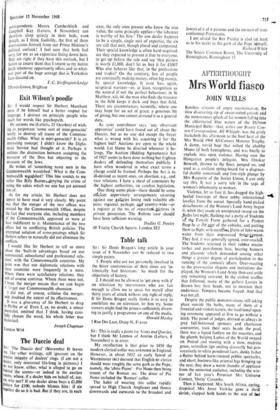Exit Wilson's poodle
Sir: I would respect Sir Herbert Merchant more if he himself had a better respect for language. I distrust on principle people who reach for words like psychopath.
He accuses me (Letters, 25 October)• of wish- ing to perpetrate 'some sort of mini-genocide' totally to destroy all traces of the Common- wealth Office. What is mini-genocide? It is an interesting concept. I didn't know the Diplo- matic Service had thought of it. Perhaps it outlines the distinction between accepting the massacre of the Ibos but objecting to the massacre of the Jews.
He writes of 'something nasty seen in the Commonwealth woodshed.' What is the Com- monwealth vied? This line sounds to me rather like Billy Bunter,„glenying the crime of eating the cakes which no one has yet accused him of.
As for my article, Sir Herbert does not appear to have read it very closely. My point was that the merger of the two offices was resisted by the Commonwealth Office, despite the fact that everyone else, including members of the Commonwealth, approved or were at least indifferent to it. Maintenance of the two offices led to conflicting British policies. The attempted solution of cross-postings which Sir Herbert refers to naturally did not eliminate the conflicts.
I would like Sir Herbert to tell us more about the 'built-in advantages based on our commercial, educational and professional rela- tions' with the Commonwealth countries. My point was that our diplomatic relations with these countries were frequently in a mess. Where there were satisfactory relations, they will of course continue. Where there were not, I hope the merger means that we can begin tr forget our Commonwealth obsession.
I did not, of course, criticise the merger, only doubted the extent of its effectiveness. It was a give-away of Sir Herbert to drag in Philby et al. Even I, as, no doubt, a smear journalist, omitted that. I think, having care- fully chosen the word, his whole letter was hysterical.
London W14
Joseph Chapman






































 Previous page
Previous page